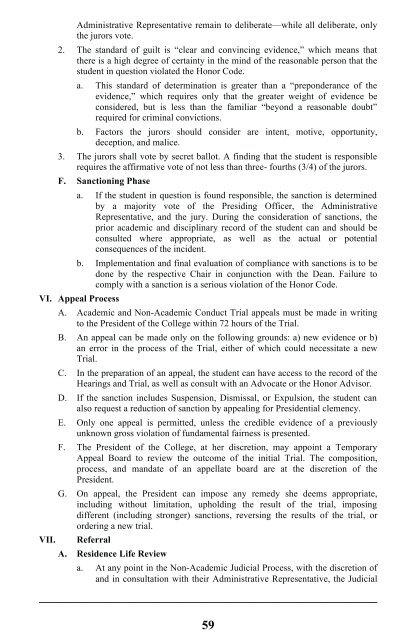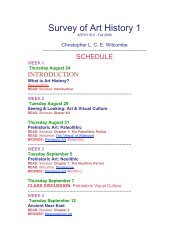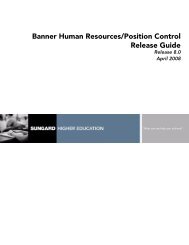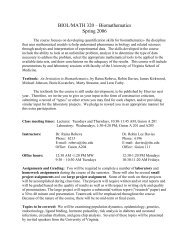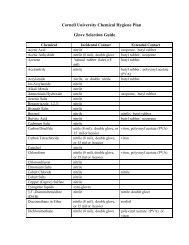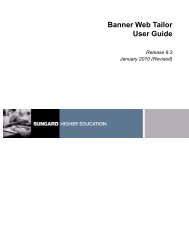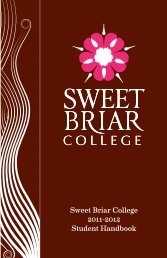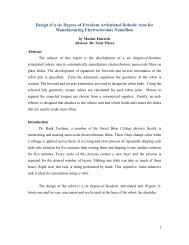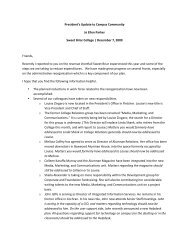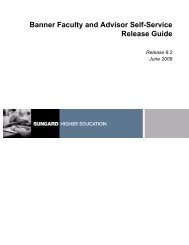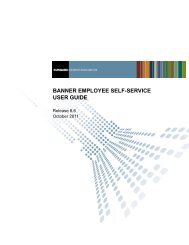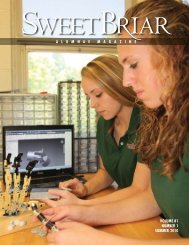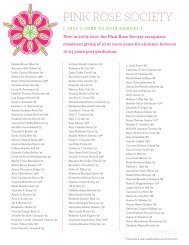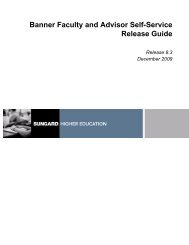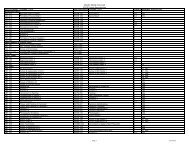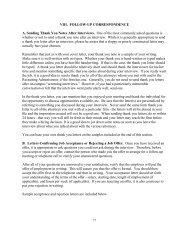Student Handbook - Sweet Briar College
Student Handbook - Sweet Briar College
Student Handbook - Sweet Briar College
You also want an ePaper? Increase the reach of your titles
YUMPU automatically turns print PDFs into web optimized ePapers that Google loves.
Administrative Representative remain to deliberate—while all deliberate, only<br />
the jurors vote.<br />
2. The standard of guilt is “clear and convincing evidence,” which means that<br />
there is a high degree of certainty in the mind of the reasonable person that the<br />
student in question violated the Honor Code.<br />
a. This standard of determination is greater than a “preponderance of the<br />
evidence,” which requires only that the greater weight of evidence be<br />
considered, but is less than the familiar “beyond a reasonable doubt”<br />
required for criminal convictions.<br />
b. Factors the jurors should consider are intent, motive, opportunity,<br />
deception, and malice.<br />
3. The jurors shall vote by secret ballot. A finding that the student is responsible<br />
requires the affirmative vote of not less than three- fourths (3/4) of the jurors.<br />
F. Sanctioning Phase<br />
a. If the student in question is found responsible, the sanction is determined<br />
by a majority vote of the Presiding Officer, the Administrative<br />
Representative, and the jury. During the consideration of sanctions, the<br />
prior academic and disciplinary record of the student can and should be<br />
consulted where appropriate, as well as the actual or potential<br />
consequences of the incident.<br />
b. Implementation and final evaluation of compliance with sanctions is to be<br />
done by the respective Chair in conjunction with the Dean. Failure to<br />
comply with a sanction is a serious violation of the Honor Code.<br />
VI. Appeal Process<br />
A. Academic and Non-Academic Conduct Trial appeals must be made in writing<br />
to the President of the <strong>College</strong> within 72 hours of the Trial.<br />
B. An appeal can be made only on the following grounds: a) new evidence or b)<br />
an error in the process of the Trial, either of which could necessitate a new<br />
Trial.<br />
C. In the preparation of an appeal, the student can have access to the record of the<br />
Hearings and Trial, as well as consult with an Advocate or the Honor Advisor.<br />
D. If the sanction includes Suspension, Dismissal, or Expulsion, the student can<br />
also request a reduction of sanction by appealing for Presidential clemency.<br />
E. Only one appeal is permitted, unless the credible evidence of a previously<br />
unknown gross violation of fundamental fairness is presented.<br />
F. The President of the <strong>College</strong>, at her discretion, may appoint a Temporary<br />
Appeal Board to review the outcome of the initial Trial. The composition,<br />
process, and mandate of an appellate board are at the discretion of the<br />
President.<br />
G. On appeal, the President can impose any remedy she deems appropriate,<br />
including without limitation, upholding the result of the trial, imposing<br />
different (including stronger) sanctions, reversing the results of the trial, or<br />
ordering a new trial.<br />
VII. Referral<br />
A. Residence Life Review<br />
a. At any point in the Non-Academic Judicial Process, with the discretion of<br />
and in consultation with their Administrative Representative, the Judicial<br />
______________________________________________________<br />
59


